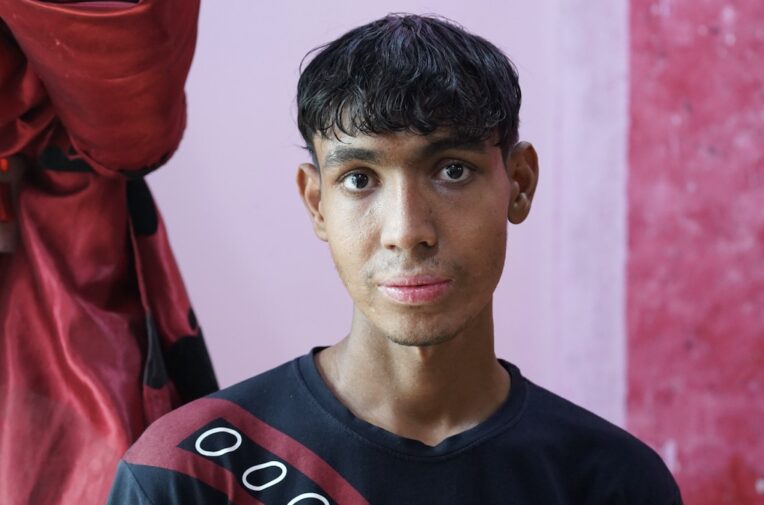
Ali Hussein Juloud in his living room in Rumaila. Photo: Jess Kelly / BBC
Six months on from Rumaila oil flaring investigation – how did BP respond?
After reporting by Unearthed and the BBC revealed rampant flaring in the company’s Iraq operations, BP promised an ‘immediate’ review. What has it done so far?
Six months on from Rumaila oil flaring investigation – how did BP respond?
After reporting by Unearthed and the BBC revealed rampant flaring in the company’s Iraq operations, BP promised an ‘immediate’ review. What has it done so far?
Ali Hussein Juloud in his living room in Rumaila. Photo: Jess Kelly / BBC
Six months ago, Unearthed, alongside the BBC, published a story revealing how out-of-control gas flaring in Iraq was contributing to climate change and causing a local public health crisis.
Responding to the story, oil giant BP, which helps run the Rumaila oil field at the centre of the investigation, said it was “extremely concerned” by the issues raised, and would “immediately review those concerns and work with our partners on any necessary interventions.” The oil field is the largest in Iraq, and BP holds the biggest stake in the organisation that runs it on behalf of the Iraqi state. So what action did the company take?
On 16 February, BP issued a press release announcing that the Rumaila Operating Organisation (ROO) was “accelerating its programme of reducing black smoke emissions” and providing “support for community health initiatives”. It also claimed that ROO had reduced flaring at its operated cites at Rumaila by “more than 65% over the past seven years”, including a 20% drop last year.
We asked BP for specifics on those points.
- BP claims that ROO has reduced flaring at Rumaila but independent figures — from the World Bank, Flare Intel, and other sources — show that flaring has remained consistently high for years. How did BP come to the conclusion that flaring is being reduced? The company declined to go into detail.
- How much money is BP and/or ROO putting in to support community health initiatives in Iraq? BP declined to comment.
- What about the “expanded and ongoing programme of air monitoring” in Iraq: will the results of that be made public? No response.
- Our investigation found that BP was not including Rumaila in its declared emissions data, giving investors and the public an incomplete picture of the company’s impact on the planet. Will BP include emissions from Rumaila in its annual emissions data from now on? Again, declined to comment.
In response to Unearthed’s questions, BP’s spokesperson said only: “Our position remains as in our updated statement of February 16.”
At the time the investigation was published, in September 2022, a company spokesperson told us: “BP does not have any ownership interest in the Rumaila field, or any right to the oil it produces, and has never been its operator. Its flaring and operational data are therefore not included in our reporting.”
Ali Hussein Juloud was central to our story. He was in remission from leukaemia when he recorded video diaries for the BBC that gave an invaluable insight into what it was like to live next to Rumaila oil field.
Recently Ali received some sad news. His cancer has returned. Now he has to travel abroad for life-saving treatment. A fundraising page has been set up so he can get the care he needs.
We asked BP whether it or ROO would consider contributing to the cost of urgent medical care needed for people in Rumaila who are suffering from cancer and other conditions that are linked to living close to gas flares. The company declined to comment.

